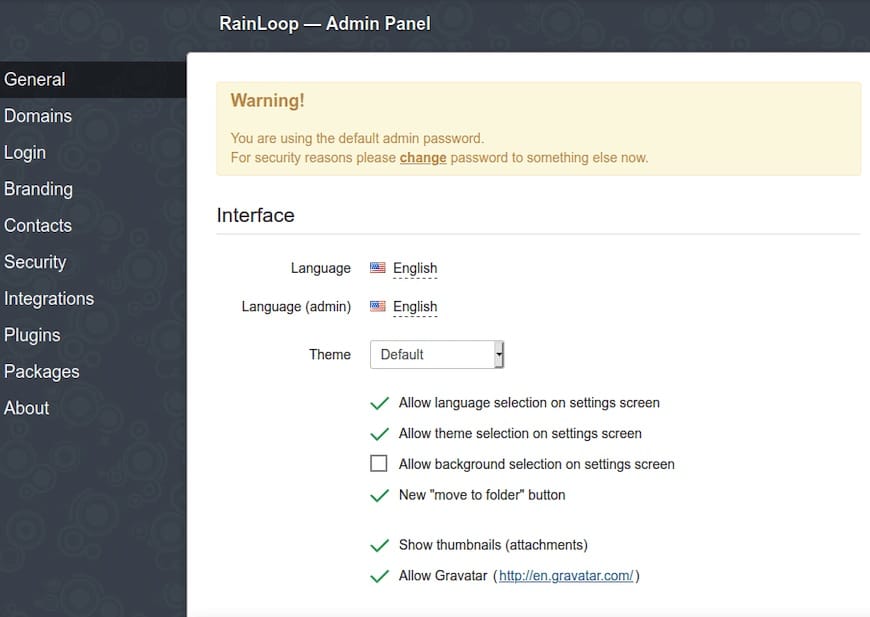
In this tutorial, we will show you how to install RainLoop Webmail on Ubuntu 20.04 LTS. For those of you who didn’t know, RainLoop Webmail is a modern, fast, and open-source web-based email client that offers a user-friendly interface and a variety of features. It supports IMAP and SMTP protocols, making it a versatile choice for managing emails.
This article assumes you have at least basic knowledge of Linux, know how to use the shell, and most importantly, you host your site on your own VPS. The installation is quite simple and assumes you are running in the root account, if not you may need to add ‘sudo‘ to the commands to get root privileges. I will show you the step-by-step installation of the RainLoop open-source, simple, modern, and fast Webmail client on Ubuntu 20.04 (Focal Fossa). You can follow the same instructions for Ubuntu 18.04, 16.04, and any other Debian-based distribution like Linux Mint.
Prerequisites
- A server running one of the following operating systems: Ubuntu 20.04, 18.04, and any other Debian-based distribution like Linux Mint.
- It’s recommended that you use a fresh OS install to prevent any potential issues.
- SSH access to the server (or just open Terminal if you’re on a desktop).
- A
non-root sudo useror access to theroot user. We recommend acting as anon-root sudo user, however, as you can harm your system if you’re not careful when acting as the root.
Install RainLoop Webmail on Ubuntu 20.04 LTS Focal Fossa
Step 1. First, make sure that all your system packages are up-to-date by running the following apt commands in the terminal.
sudo apt update sudo apt upgrade
Step 2. Installing the LAMP stack.
A Ubuntu 20.04 LAMP server is required. If you do not have LAMP installed, you can follow our guide here.
Step 3. Installing AbanteCart on Ubuntu 20.04.
First, create a directory for RainLoop in your webroot directory:
sudo mkdir /var/www/rainloop cd /var/www/rainloop
By default, RainLoop is not available on Ubuntu 20.04 base repository. Now we run the commands below to download the latest version of the RainLoop Webmail script installer from the official source:
sudo wget -qO- https://repository.rainloop.net/installer.php | sudo php
We will need to change some folders permissions:
sudo chown -R www-data:www-data /var/www/rainloop sudo chmod -R 755 /var/www/rainloop
Step 4. Configure Apache VirtualHost for RainLoop.
Now we create a new virtual host directive in Apache. For example, create a new Apache configuration file named ‘rainLoop.conf’ on your virtual server:
sudo nano /etc/apache2/sites-available/rainloop.conf
Add the following file:
<VirtualHost *:80>
ServerAdmin admin@your-domain.com
ServerName your-domain.com
ServerAlias www.your-domain.com
DocumentRoot /var/www/rainloop/
<Directory />
Options +Indexes +FollowSymLinks +ExecCGI
AllowOverride All
Order deny,allow
Allow from all
Require all granted
</Directory>
<Directory /var/www/rainloop/data>
Require all denied
</Directory>
ErrorLog /var/log/apache2/rainloop_error_log
TransferLog /var/log/apache2/rainloop_access_log
</VirtualHost>
Save and close the file, then restart the Apache webserver so that the changes take place:
sudo a2enmod rewrite sudo a2ensite rainloop.conf sudo systemctl restart apache2
Step 5. Set up HTTPS.
We should enable a secure HTTPS connection on PrestaShop. We can obtain a free TLS certificate from Let’s Encrypt. Install the Let’s Encrypt client (Certbot) from Ubuntu 20.04 repository:
sudo apt install certbot python3-certbot-apache
Next, run the following command to obtain a free TLS certificate using the Apache plugin:
certbot --apache -d your-domain.com
You will be asked to provide your email and accept the term of service:
Enabled Apache rewrite module Redirecting vhost in /etc/apache2/sites-available/rainloop.conf to ssl vhost in /etc/apache2/sites-available/rainloop-le-ssl.conf - - - - - - - - - - - - - - - - - - - - - - - - - - - - - - - - - - - - - - - - Congratulations! You have successfully enabled https://your-domain.com You should test your configuration at: https://www.ssllabs.com/ssltest/analyze.html?d=your-domain.com - - - - - - - - - - - - - - - - - - - - - - - - - - - - - - - - - - - - - - - - IMPORTANT NOTES: - Congratulations! Your certificate and chain have been saved at: /etc/letsencrypt/live/your-domain.com/fullchain.pem Your key file has been saved at: /etc/letsencrypt/live/your-domain.com/privkey.pem Your cert will expire on 2022-06-11. To obtain a new or tweaked version of this certificate in the future, simply run certbot again with the "certonly" option. To non-interactively renew *all* of your certificates, run "certbot renew" - If you like Certbot, please consider supporting our work by: Donating to ISRG / Let's Encrypt: https://letsencrypt.org/donate Donating to EFF: https://eff.org/donate-le
If the test is successful, reload Apache for the change to take effect:
sudo apache2ctl -t sudo systemctl reload apache2
Step 6. Configure Firewall.
By default, the UFW firewall is enabled on Ubuntu. Depending on your Apache virtual host configuration file, open ports 80 and 443 to allow HTTP and HTTPS traffic:
sudo ufw allow 80/tcp sudo ufw allow 443/tcp sudo ufw reload
Step 7. Accessing RainLoop Webmail Web Interface.
Once successfully installed, open your web browser and access the RainLoop web interface using the URL https://your-domain.com. The default admin login credentials are:
Username: admin Password: 12345
Change the default admin password immediately for security reasons. Navigate to the Security menu in the admin panel to update your password.
You should see the following page:

Congratulations! You have successfully installed RainLoop. Thanks for using this tutorial for installing the RainLoop Webmail on Ubuntu 20.04 LTS Focal Fossa system. For additional help or useful information, we recommend you check the official RainLoop website.